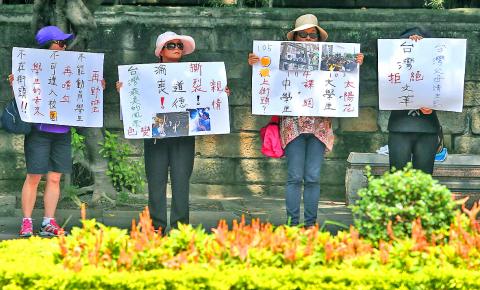“He was not a kid who could be manipulated by political parties,” said the mother of Dai Lin (林冠華), who apparently took his own life on Thursday last week allegedly in protest against high-school curriculum guideline changes.
Underlining her son’s determination to “stir up public opinion with his death,” Lin’s mother blames herself for having misunderstood him.
“It is society, adults and parents who have been brainwashed, like me, that need treatment,” she said.

Photo: CNA
Shih Hsin University professor Wang Hsiao-po (王曉波), a Chinese Nationalist Party (KMT) member and convener of the Ministry of Education’s (MOE) curricular adjustment committee, has accused opposition parties of hiding behind and instigating student protests.
Lin’s mother responded to Wang’s allegations on Facebook.
“He was not a kid who could be manipulated by political parties. He was not blind; he was true to his own will and had followers,” she wrote.
“Please do not claim that the students are manipulated by political parties. Kuan-hua used all the pocket money I gave him to print fliers for the curriculum protest movement. He often had just one meal a day; I thought he had been squandering his money. [The protesters] were so abandoned and unaided, with their voice unheard, exactly because they have not been supported by any political party. Please listen to what these pure children have to say with a genuine heart,” she wrote.
Lin’s mother asked her son to forgive her.
“I misunderstood you and exposed you to pressure. I mistook a gem for a dimwit. Only now do I understand your perseverance and willpower to achieve your ideal. It is society, adults and parents who have been brainwashed, like me, that need treatment. You were a little prince, who had pure thinking. You completed your mission,” she added.
After looking through information, video clips and her son’s mobile phone, Lin’s mother said: “I have been moved by what he was doing.”
Lin’s mother said that her son was a child who lived according to his will, resisting traditional disciplining and teaching, which caused constant family conflict.
He would apply for withdrawal from school, for example, in order to concentrate all his efforts into the movement, his mother said.
“However, we, as parents, accused him of misplacing his intelligence,” and in turn made him feel that he had let his parents down, she said.
“He insisted on what he believed was right; he wanted the public to realize how important the issue is,” she said. “Witnessing that so many of Kuan-hua’s friends wish to continue putting their efforts into his cause, I am stunned. He stirred the public with his actions.”
Lin’s mother uploaded a photograph on Facebook showing the sit-in at the ministry compound, asking the public to stop saying that the students have been manipulated.
“They have been so isolated because they have had no political support,” she said, adding that if adults could not believe that the younger generation is capable of thinking independently, then they are admitting to their own failure in education.
In addition to Lin’s participation in the Sunflower movement in March last year, he also offered “free hugs” outside the Taipei MRT system’s Jiangzicui Station (江子翠) after Cheng Chieh’s (鄭捷) killing spree in May last year, where Lin carried a banner reading: “We have all been too indifferent.”

An essay competition jointly organized by a local writing society and a publisher affiliated with the Chinese Communist Party (CCP) might have contravened the Act Governing Relations Between the People of the Taiwan Area and the Mainland Area (臺灣地區與大陸地區人民關係條例), the Mainland Affairs Council (MAC) said on Thursday. “In this case, the partner organization is clearly an agency under the CCP’s Fujian Provincial Committee,” MAC Deputy Minister and spokesperson Liang Wen-chieh (梁文傑) said at a news briefing in Taipei. “It also involves bringing Taiwanese students to China with all-expenses-paid arrangements to attend award ceremonies and camps,” Liang said. Those two “characteristics” are typically sufficient

A magnitude 5.9 earthquake that struck about 33km off the coast of Hualien City was the "main shock" in a series of quakes in the area, with aftershocks expected over the next three days, the Central Weather Administration (CWA) said yesterday. Prior to the magnitude 5.9 quake shaking most of Taiwan at 6:53pm yesterday, six other earthquakes stronger than a magnitude of 4, starting with a magnitude 5.5 quake at 6:09pm, occurred in the area. CWA Seismological Center Director Wu Chien-fu (吳健富) confirmed that the quakes were all part of the same series and that the magnitude 5.5 temblor was

The brilliant blue waters, thick foliage and bucolic atmosphere on this seemingly idyllic archipelago deep in the Pacific Ocean belie the key role it now plays in a titanic geopolitical struggle. Palau is again on the front line as China, and the US and its allies prepare their forces in an intensifying contest for control over the Asia-Pacific region. The democratic nation of just 17,000 people hosts US-controlled airstrips and soon-to-be-completed radar installations that the US military describes as “critical” to monitoring vast swathes of water and airspace. It is also a key piece of the second island chain, a string of

The Central Weather Administration has issued a heat alert for southeastern Taiwan, warning of temperatures as high as 36°C today, while alerting some coastal areas of strong winds later in the day. Kaohsiung’s Neimen District (內門) and Pingtung County’s Neipu Township (內埔) are under an orange heat alert, which warns of temperatures as high as 36°C for three consecutive days, the CWA said, citing southwest winds. The heat would also extend to Tainan’s Nansi (楠西) and Yujing (玉井) districts, as well as Pingtung’s Gaoshu (高樹), Yanpu (鹽埔) and Majia (瑪家) townships, it said, forecasting highs of up to 36°C in those areas